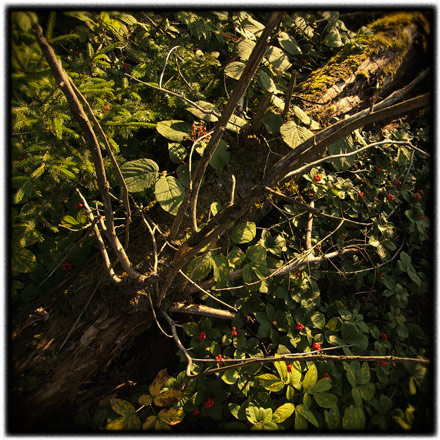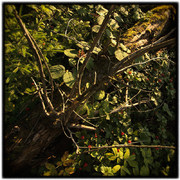ku # 531 ~ on seeing
 Thursday, August 14, 2008 at 10:24AM
Thursday, August 14, 2008 at 10:24AM 
 Fallen tree and red berries • click
Fallen tree and red berries • click
to embiggenAre you ever shocked when you realize that some of things that you do without thinking - things that are "second nature" to you - seem to be very foreign concepts to others?
Say, like ... walking, chewing gum, and breathing all at the same time. Some can do it with ease, others end up tripping all over themselves. Now maybe that's bit of an exaggeration, but you probably get the point.
In any event, I have become very aware, over the past year in particular, that a whole lot of people simply don't see in the way that I see. Some might opine that that's because I have, as a photographer, "trained my eye" to see things that others don't notice but, as I have mentioned before, that ability / condition / freak of nature / whatever you want to call it has been with me long before I ever picked up a camera. When I think about it, I am consciously aware of my propensity for intense looking as far back as early childhood. Consequently, you could say that looking and seeing are second nature to me.
And, in fact, since early childhood, I have always had a desire / need to express that looking / seeing as some form of visual "art". Throughout my youthful festering, I was repeatedly plucked from the obscurity of the lunch box rabble / blackboard jungle and presented with awards, adulation, privileges, honors, and, yes, even cold hard cash simply by doing what came easy - drawing things that I saw all around me.
Oddly enough, even though I grew up literally in the shadow of the Great Yellow Father, AKA, Kodak in Rochester NY, I never picked up a camera in earnest until I found myself living in Japan. I wanted to take pictures of the place / experience, cameras were dirt cheap and, once again, within 3 months of buying my first camera, a Petri 7s, I was plucked from obscurity and given awards, privileges, and a cushy job (as a photographer) because I was doing something that came easy - making pictures of things that I saw all around me.
Now, 41 years after that photo-awakening, I can look back upon a life in photography. It's how I made a living and how I expressed my personal looking and seeing (and continue to do both) and I have to say that the picture making always seemed easy and second nature to me.
So, it comes as a surprise to me that most others do not look and see in anything like the manner I do. It has become increasingly obvious to me that most people are almost blind to the physical world around them. They seem to look and see enough just to navigate (I mean that literally) their way around the planet but beyond that actually take notice of very little of the physical world that they inhabit.
2 cases in point -
Yesterday's picture of my picture. This framed picture, 44×30 inches, sits right inside our front door - the door that everyone uses to come and go through. One does not actually have to navigate around it when coming and going but I am at a loss to figure how anyone could not see it. So, imagine my surprise when I asked a friend of coma girl what she thought of the picture and the response was, "What picture?". I responded, "The rainbow picture." She responded, "What rainbow picture?"
It should be noted that this person had to have come and gone many times since the picture made its appearance. Apparently, it was "invisible". But even more amazing was the fact that, once we were standing in front of it, she asked, "Where was this picture taken?" I was flabbergasted - it was taken on a stretch of main highway that she must have driven by, oh, say, about a billion times in the last 19 years of her life. Once I explained where it was, she could even name the people who lived there but apparently she never "noticed" the place before. Simply amazing.
The Jersey Shore. The wife has been going to the Jersey Shore, Stone Harbor in particular, for, oh, say, 40+ years or so. It's a family affair (and it's a big family). When I first began to picture the place in earnest, 2 years ago, her response to the pictures was simply, "When I go to the Shore, that's not what I see."
Yikes.
What the hell else is there to see? Apparently, the physical world of Stone Harbor is just an incidental backdrop to family, friends, and fun. Nothing wrong or (apparently) unusual about that but I am left wondering if she would notice the physical surroundings if the family got together on the moon. Maybe. Maybe not.
It is often remarked, when someone does something remarkably stupid, "Where was he/she when they passed out the brains?" I am beginning to wonder, "Where the hell were they when they passed out the eyes?"

Reader Comments (11)
mark
you certainly hit the nail right on with this blog on seeing. Aside from some details, it echos comments that I have made (verbally) many times in the past. People for the most part are indeed blind to their world, which is full of wonder and beauty despite the abundance of the ugly.
It sounds like our progression through the artistic experience is also very similar.
I do enjoy your blogs.
regards,
adam
If the moon had cheesesteaks, beer and you could get to everyone's house without having to drive, it would probably work just as well.
In defense of "coma girl's" friend (your title of her, not mine), my 13 year old stepson had a pile of puppy shit directly under his chair at his computer desk (where he sits nightly for hours) for what looked like weeks judging by the briquette state it had achieved. I could probably place a $100 bill on the back of his bedroom door and it would go unnoticed forever. I think you can chalk the case of coma girl's friend up to the results of youth.
I would say you see things that many "photographers" don't see. Your first posts on the forums of various nature photo "critique" sites shows that pretty obviously.
It's pretty easy to "see" a candy-colored sunset on a cotton-candy shoreline, but to get to the essence of a place requires looking around at times besides sunrise/sunset.
I "see" things around me more akin to the way you do, I think. These photo "critique" sites seem to be very good at training people to see the way the group does, but does not give them the tools to look beyond. Which is why I tend to gravitate toward work more akin to the "ku" and similar work more often than the postcard philosophy of much of what's available on the interweb.
"Coma" is how most of us live most of the time, though. We conventionalize what we only partially see.
Google "immediate perception" to see how neuroscience and non-western philosophies tackle this.
Example: http://ccbs.ntu.edu.tw/FULLTEXT/JR-ADM/indian.htm
Had to chuckle at Aaron's puppy shit story because not too long ago I went down to our basement TV/teen room and immediately saw, not three feet to the right of the television screen, on the carpet, was a huge (monstrous really) pile of petrified dog shit. I was flabbergasted that my 17 year old daughter failed to notice that for probably two days--at least! I understand the egocentricity of teen girls but you gotta be kidding me! What's even funnier is how she refused to believe it was actually there while she watched hours of TV--but it had to have been. It was rock hard and had lost most of it's odor....
I find great humor in that story of course, but it's also a good metaphor for many of the human beings on this planet. Periphery is irrelevant it seems, and I think that can be applied to listening skills as well as "looking" skills. It's downright demoralizing at times to be honest.
Can I throw out another quote from one of my favorite sources of inspiration? From John Burroughs:
"There is nothing more in which people differ more than in their powers of observation. Some are only half alive to what is going on around them. Others, again, are keenly alive: their intelligence, their powers of recognition, are in full force in eye and ear at all times. They see and hear everything, whether it directly concerns them or not. They never pass unseen a familiar face on the interesting street; they are never oblivious of any feature or sound or object in the earth or sky about them. Their power of attention is always on the alert, not by concious effort, but by natural habit and disposition.---- We may see coarsely and vaguely, as most people do, noting only masses and unusual appearances, or we may see finely and discriminatingly, taking in the minute and the specific."
He goes on to suggest that this human quality is very much like the sight and scent skills of animals in the wild. I think it is edging towards extinction in human beings.
Very well said Mary. I also believe that it is on the brink of extinction.
My story with the teenage sons was with dog vomit.
My story involves Gravitas and laundry.
Just because a lot of people appear to be zombies, doesn't mean they actually are zombies, or that we should be judgemental about them being zombies.
My first real camera was a Petri 7, too.
Mary,
You quote made me think of the description of a "highly sensitive person" (which I am).
"According to Dr. Aron's definition, the Highly Sensitive Person (HSP) has a sensitive nervous system, is aware of subtleties in his/her surroundings..."
"About 15 to 20 percent of the population have this trait. It means you are aware of subtleties in your surroundings, a great advantage in many situations."
"Do you notice or enjoy delicate or fine scents, tastes, sounds, or works of art?
Do you have a rich and complex inner life? "
"Many HSPs are often unusually creative and productive workers, attentive and thoughtful partners, and intellectually gifted individuals."
The downside to this is that HSPs can be easily overwhelmed or overstimulated in situations that others wouldn't be.
Check out Dr. Aron's website. http://www.hsperson.com/
I feel most of the time just like your quote describes. I could go on a hike with friends and I would be able tell them every wildflower in bloom along the way that they never even noticed. I would notice sounds and odors as well. People can rarely sneak up on me. It is as if my awareness is spread out and I sense them before they even get to me.
I can also be a hazard driving (as Rich can attest to) because I am noticing things along the way instead of keeping my eyes on the road, even if it is the same route I drive everyday. I see all the changes and differences from the last time I drove it.
I am also good for finding things. If I see you set something somewhere and then you can't remember, I could tell you exactly where you put it, as it is a complete scene in my mind's eye.
I guess your quote set off some thoughts that may or may not fit in this entry!
I also know the saying continues on to say they were actually standing in line for the huge manly body part. :p